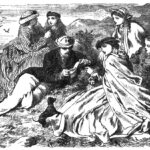It is difficult to escape charisma in American life. Media outlets tout stories of individuals with a seemingly hypnotic sway over their followers. Social Media influencers seek to gain followers and capitalize economically on personal allure and charm. In recent history, “rizz” (an abbreviation of charisma) was the 2023 word of the year. Yet, the essence of charisma seems elusive as it has been leveraged from both good and bad actors alike in leading followers towards a spectrum of valiant to malicious ends. As such, Molly Worthen’s recent publication of Spellbound: How Charisma Shaped American History from the Puritans to Donald Trump is timely for the American imagination.
With charisma being a term frequently used, yet often widely misunderstood, Worthen makes clear the book’s intent is to simultaneously trace two narratives of “the story of charisma in the theological sense, and as a tool to describe public figures who energize a following. . . . they are distinct but related modes in which humans chase after unseen powers that promise to organize life’s chaos and lend it meaning” (xviii). Spellbound’s intent is not to explore the cult of celebrity and followers. The scope of the book’s project is clear as Worthen offers a robust mosaic depicting a congruent historical narration of how charismatic leaders shaped and impacted American religious and political life. Spellbound is organized along a linear historical timeline from 1634 to the present day while highlighting various shifts in charisma through the categories of prophets, conquerors, agitators, experts, and gurus.
According to Worthen, “Prophets were destroyers and purifiers” (65). Highlighting individuals such as Puritan Anne Hutchinson, evangelist George Whitefield, or spiritual mystic The Public Universal Friend, Spellbound demonstrates how these individuals enacted spiritual and religious reform to America Christianity through prophetic charisma. They were deeply enveloped within the religious institutions which they sought to reform yet stood enough on the fringes to claim specific, Holy Spirit-led insights to counter dominant assumptions. Prophetic charisma disestablished the authority of the very institutions these leaders emerged from.
As the establishments of church and state shifted in post-revolutionary America, Spellbound accounts for conquerors, the leaders whose charisma mastered and rebuilt these flailing institutions. The nineteenth century established an American ethos in which “more and more white Americans began to think about mastery. They wanted to prevail and to build” (70). Worthen accounts for a spectrum of charismatic leaders from Andrew Jackson to Joseph Smith, leaders who emerge as heroes who draw followers to lean into a sense of manifest destiny. Here, the book offers a helpful depiction of how charisma is often tied to a story of reality. Charismatic leaders leverage stories to account for meaning amidst life’s absurdities, justice in the face of adversity, or conquest in response to life’s struggles.
With the turn of the twentieth century, Worthen makes the case for agitators. Like the prophets before, charismatic agitators disrupted the preexisting conditions of political and religious systems. The text pays particular attention to Max Weber’s contributions to charisma impacting social psychology. Worthen argues, “[Weber] defined charisma as a creative power that commanded authority in every human sphere. …Weber envisioned charisma as a form of authority distinct from power based on tradition or law or military might” (184). Confirming Weber’s framework for charisma, agitators needed no backing of religious structures or political systems to woo and lead their followers. A prime example would be William Seymour leading the Azusa Street Revival in downtown L.A. in 1905. As New Testament charisms fueled this revival, the Pentecostalist movement emerged independently of any mainline Protestant denomination. Similarly on the political spectrum, Spellbound features individuals like Louisiana governor and U.S. Senator Huey Long, who disregarded normative political convention with his flair for the theatrical. Worthen argues charisma was a deciding factor in individuals like Seymour and Long, who disrupted a status quo and gained a following.
Part IV of Spellbound features the rise of experts. At the mid-twentieth century, charismatic leadership from experts acted as a stabilizing force for a country recently distressed by economic depression and worldwide wars. Americans entrusted the public sphere to Albert Einstein’s scientific insights or Dwight Eisenhower’s military expertise. Followers looked to leaders like John F. Kennedy, or Martin Luther King Jr., both of whom “combined reason and charisma” (254). If the agitators of prior decades disrupted religious and political systems, Worthen demonstrates how experts leveraged charisma to shore up foundational assumptions of the American way of life. As she argues, “Charisma depends on telling a good story. The age of the experts turned on a story of science as savior, specialized knowledge as the mechanism of happiness” (263). The text contends that Americans looked to and largely trusted the experts, until facing significant cultural breakdowns surrounding civil rights and the economy.
In the final section, Worthen focuses on the gurus of the late twentieth century ranging from the “psychological manipulation” (292) of Maharaj Ji to the “grab bag of positive thinking and pop mysticism” (328) of Oprah. The book demonstrates how the American imaginary looked no longer to the experts in the field with specialized knowledge, but to those with a third sense who flout special (i.e. privileged) insight into reality. According to Worthen, gurus “criticized the wisdom and rules of traditional institutions. . . . [they] promised followers an end run around the authority of churches, schools, or political structures” (292). Gurus promote a sense of self-actualization if followers just pay heed to their special insight.
Overall, Spellbound offers a well-researched account of charismatic individuals and sects, animating the reader’s imagination for American history. Admirably, Worthen consistently provides descriptive historical accounts, and veers away from any normative assumptions of history’s past implicating the present. The assumption that “history repeats itself” never appears. What remains preeminent within the text is Worthen’s ability to keep charisma front and center. Hence, when Worthen suggests Andrew Jackson “had the affection of the people. . . . the people declaring him their tyrant, the hero who channeled their resentment and longing. Their swelling enthusiasm confirmed that perverse law of charismatic appeal that applied again and again in American history: The more Jackson appalled his critics, especially the ‘respectable ones’ the more attractive he became” (92). If a reader draws any correlations to a present-day Jacksonian political figure, it is not an extension of history being repeated, but merely a feature of charisma and how it can be problematically manifested within a variety of leadership styles.
Some readers may close the book with the desire for a more detailed and comprehensive account of the ways in which journalism and media have shaped American perception of charismatic leaders, particularly within the twentieth century. Though Worthen provides an exemplary account of the rise of Rush Limbaugh and how he “pioneered the daily conservative liturgy” and “gave American conservatives license to substitute cynicism for understanding,” it is hard to separate media from American religious and political life (349-351). Further, Worthen does not extensively include the cult of music and entertainment personalities, and outspoken celebrities can and do sway public opinion as it relates to American conceptions of flourishing.
Worthen’s book is a helpful guide for those grappling with charisma in American life, and she insightfully expands our perception of how the phenomenon informs and influences our own social imaginary. Historically, she demonstrates how charisma is a cultural leavening agent, one which cultivates change for both good and ill. Let us pay heed to Worthen’s argument and be cautious of our own hubris, lest we too become “spellbound,” and drawn towards ends incompatible with human flourishing, both for our sake and for the sake of our neighbors.







